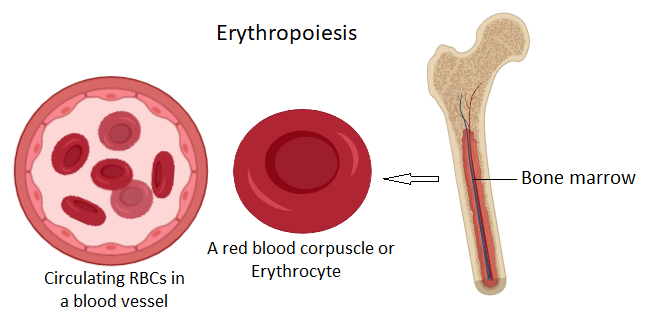Question
Question: Which of the following hormone helps in the production of RBC? A. Erythropoietin B. Insulin C...
Which of the following hormone helps in the production of RBC?
A. Erythropoietin
B. Insulin
C. Prostaglandins
D. None of the above
Solution
RBCs or red blood cells are the most important cells of the body. They circulate in the whole body through various blood vessels. The RBCs are carrier type cells as they carry oxygen from the lungs and other parts to all the cells. Haemoglobin pigment present in RBCs imparts them the red color. A hormone produced by the kidney acts in the bone marrow to synthesize RBCs.
Complete answer: The blood is the key body fluid. It is a mobile connective tissue that consists of fluid, plasma, and various cell types. RBCs or Erythrocytes are the components of the blood. Red blood corpuscles are the most abundant cells present in the blood. These are enucleated cells having a biconcave and circular shape. They are advantageous in the gaseous exchange in the blood. They carry haemoglobin protein due to which they are red in color.
-The haemoglobin holds the oxygen molecules and supplies them to cells where needed. The process of formation of RBCs is termed as erythropoiesis. In the embryonic period, the RBCs are produced by the liver and spleen. But after the birth of the baby, the RBCs are synthesized by the bone marrow.

-The hormone called erythropoietin is secreted by the kidney that stimulates the bone marrow to synthesize RBCs where there is a shortage of RBCs. Oxygen shortage stimulates the cells in the kidney to produce erythropoietin.
-Insulin is a hormone secreted by the pancreas that regulates blood sugar levels. Prostaglandins are hormones that stimulate uterine contraction during parturition.
Therefore, the right answer is option A.
Note: The excess depletion of RBCs in the blood can be lethal. Except for erythropoietin, other factors are required for RBCs production. These are iron, proteins, vitamin B12, and folic acid. Iron and proteins act as raw materials for RBCs production and vitamin B12 and folic acid stimulates maturation in red blood cells.
